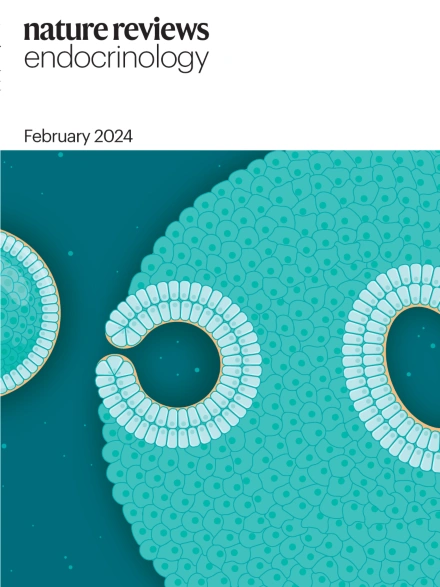Steroid hormones as modulators of anti-tumoural immunity
IF 40
1区 医学
Q1 ENDOCRINOLOGY & METABOLISM
引用次数: 0
Abstract
Immune evasion is a hallmark of cancer progression but the role of steroid hormones in this evasion has long been underrated. This oversight is particularly notable for glucocorticoids given that exogenous glucocorticoids remain a cornerstone therapy in various oncological treatment regimens, supportive care and treatment of immune-related adverse events caused by immune-checkpoint inhibitors. Cortisol, the main endogenous glucocorticoid in humans, is secreted by the adrenal cortex in response to stress. Additionally, cortisol and its inactive metabolite cortisone can be interconverted to further modulate tissue-dependent glucocorticoid action. In the past 5 years, intratumoural production of glucocorticoids, by both immune and tumour cells, has been shown to support tumour immune evasion. Here, we summarize current progress at the crossroads of endocrinology and immuno-oncology. We outline the known effects of steroid hormones on different immune cell types with a focus on glucocorticoids and androgens. We conclude with options for pharmaceutical intervention, including the engineering of cell-based therapies that resist the immunosuppressive action of steroid hormones. Overall, local steroid production and metabolism are emerging elements of tumour immune suppression that are potentially amenable to therapeutic intervention. Targeting steroid hormones to enhance anticancer therapies could increase their efficacy but will require expertise in endocrine care. Cancer immunotherapies utilize the immune system to attack tumour cells but steroid hormones have immunosuppressive effects that can reduce immunotherapy efficacy. This Review discusses the role of steroid hormones, both endogenous and exogenous, on tumour-associated immune cells and cancer immunotherapies.


类固醇激素作为抗肿瘤免疫的调节剂
免疫逃避是癌症进展的一个标志,但类固醇激素在这种逃避中的作用一直被低估。考虑到外源性糖皮质激素仍然是各种肿瘤治疗方案、支持性护理和治疗免疫检查点抑制剂引起的免疫相关不良事件的基础疗法,这种疏忽对糖皮质激素尤其值得注意。皮质醇是人体内主要的内源性糖皮质激素,是肾上腺皮质在应激反应中分泌的。此外,皮质醇及其无活性代谢物可的松可以相互转化,进一步调节组织依赖性糖皮质激素的作用。在过去的5年中,免疫细胞和肿瘤细胞在肿瘤内产生糖皮质激素,已被证明支持肿瘤免疫逃逸。在此,我们总结了目前在内分泌学和免疫肿瘤学交叉领域的进展。我们概述了已知的类固醇激素对不同免疫细胞类型的影响,重点是糖皮质激素和雄激素。我们总结了药物干预的选择,包括抵抗类固醇激素免疫抑制作用的细胞治疗工程。总的来说,局部类固醇产生和代谢是肿瘤免疫抑制的新兴因素,可能适合治疗干预。针对类固醇激素加强抗癌治疗可以提高其疗效,但需要内分泌护理方面的专业知识。
本文章由计算机程序翻译,如有差异,请以英文原文为准。
求助全文
约1分钟内获得全文
求助全文
来源期刊

Nature Reviews Endocrinology
医学-内分泌学与代谢
CiteScore
42.00
自引率
0.70%
发文量
158
审稿时长
6-12 weeks
期刊介绍:
Nature Reviews Endocrinology aspires to be the foremost platform for reviews and commentaries catering to the scientific communities it serves. The journal aims to publish articles characterized by authority, accessibility, and clarity, enhanced with easily understandable figures, tables, and other visual aids. The goal is to offer an unparalleled service to authors, referees, and readers, striving to maximize the usefulness and impact of each article. Nature Reviews Endocrinology publishes Research Highlights, Comments, News & Views, Reviews, Consensus Statements, and Perspectives relevant to researchers and clinicians in the fields of endocrinology and metabolism. Its broad scope ensures that the work it publishes reaches the widest possible audience.
 求助内容:
求助内容: 应助结果提醒方式:
应助结果提醒方式:


